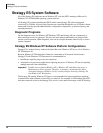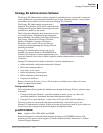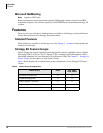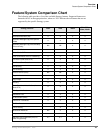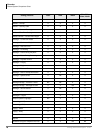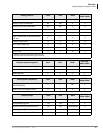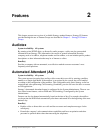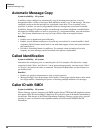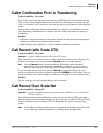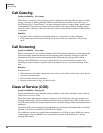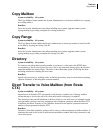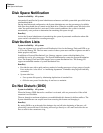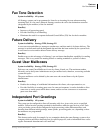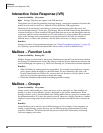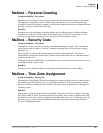
Features
Automatic Message Copy
20 Stratagy General Description 01/03
Automatic Message Copy
System Availability: All systems
A mailbox can be configured to automatically copy all incoming messages into a second
designated mailbox’s folder of messages. Both mailboxes retain a copy of the message. The times
(start/end) can be set that the messages are copied and a time delay, if one is needed, can be
specified. A mailbox can also be programmed to delete a message once it has been forwarded.
In addition, Stratagy ES software enables a user through a touchtone telephone to enable/disable
this feature for his/her mailbox as well as set options (e.g., designated mailbox, start and end times,
etc.). The System Administrator can stop (lock out) the user from accessing this feature.
Benefit(s)
• Enables users to handle mail more efficiently.
• Enables several different mailboxes to forward any received mail to a central mailbox. Small
companies find this feature useful since it can make them appear to have more personnel than
they actually have.
• Provides a forwarding feature for mailboxes. For example, when an employee has left a
company, any new messages can be forwarded to the person’s replacement.
Called Identification
System Availability: All systems
Announces the called party prior to connecting the call. For example, calls directed to a single
extension for both “Sales” and “Service” can be answered appropriately, since the words “Sales”
or “Service” play before the caller is connected. The System Administrator sets this feature on a
per-mailbox basis.
Benefit(s)
• Enables two people or departments to share a single extension.
• Message Pooling is also an advantage of this feature. All messages left after hours can be stored
in a single mailbox, eliminating the process of checking multiple mailboxes for messages.
Caller ID with SMDI
System Availability: All systems
When a Stratagy system is integrated via SMDI with the Strata CTX/Strata DK telephone systems
that support caller ID, the incoming Calling Party ID is played as part of the header information of
the message. With the use of the Token Programming Language, Stratagy can also play a specific
greeting or route a call based on the telephone number received from the SMDI/Caller ID
information.



